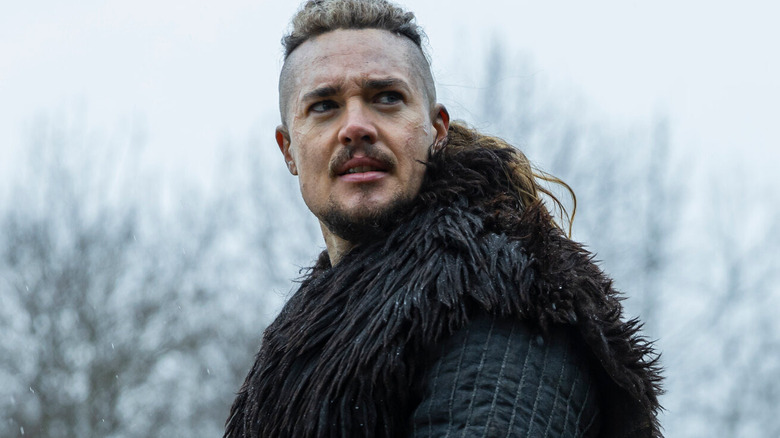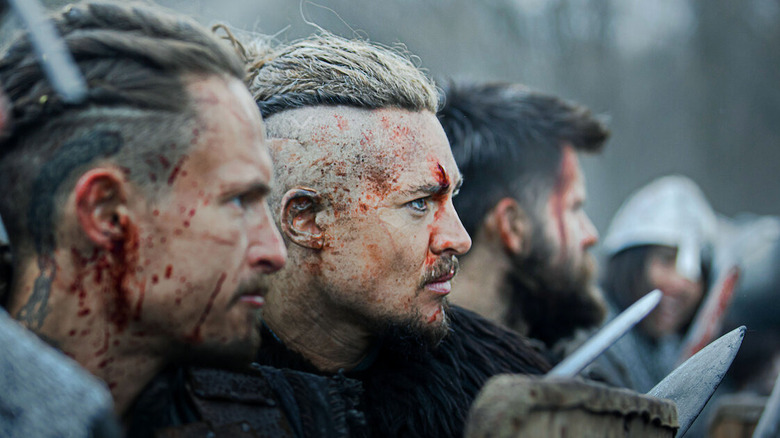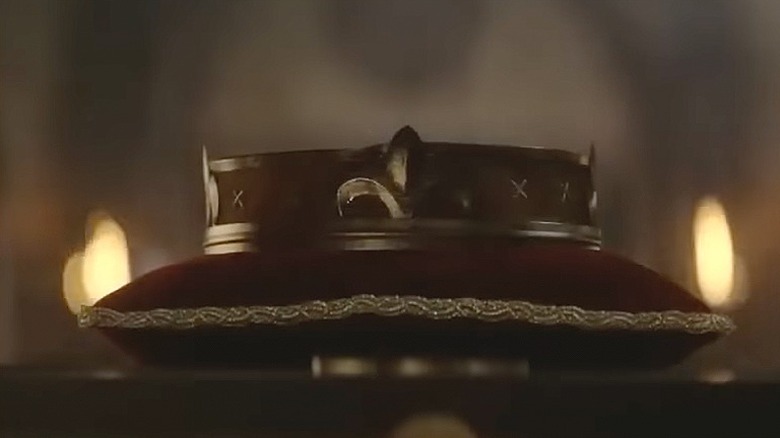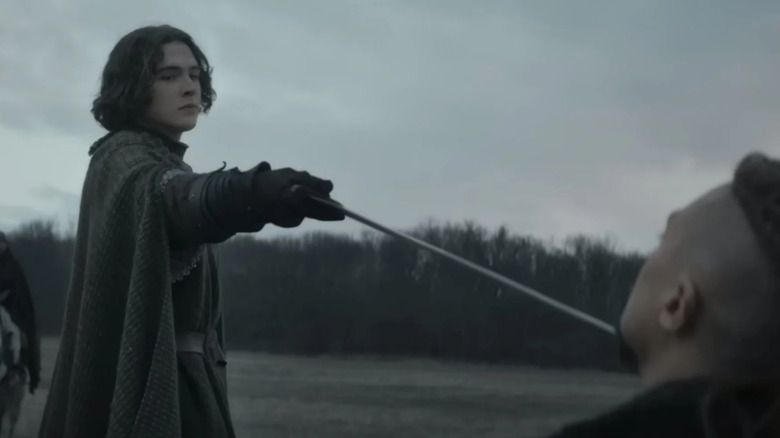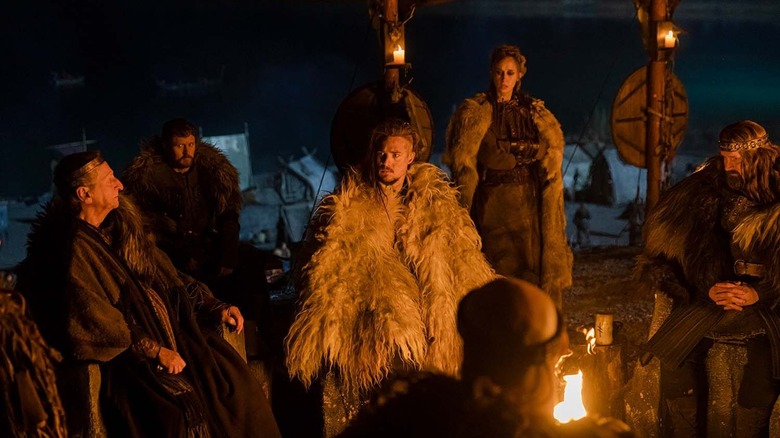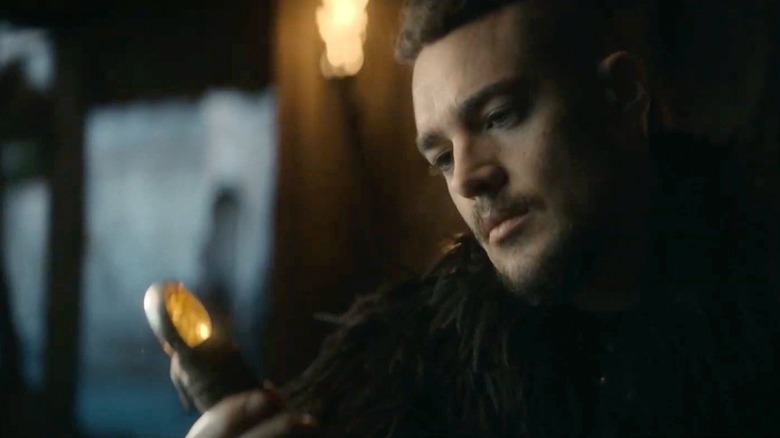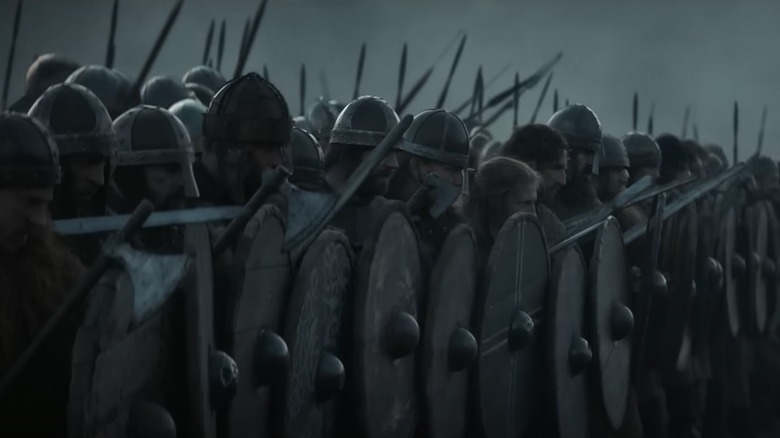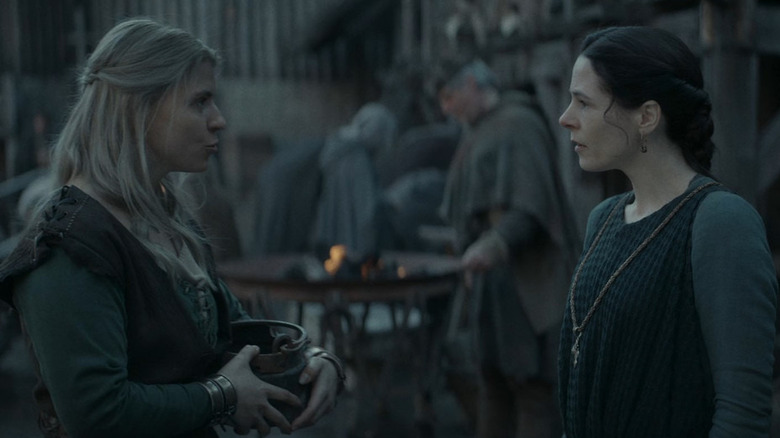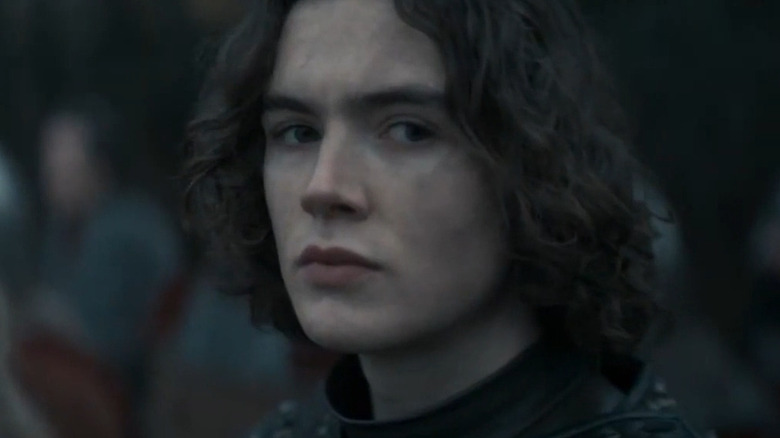The Ending Of The Last Kingdom: Seven Kings Must Die Explained
"The Last Kingdom: Seven Kings Must Die" is the epic sequel and conclusion to the series of the same name, based on author Bernard Cornwall's "The Saxon Stories," about key players in the formation of England more than 1000 years ago. But viewers need not have read the books or kept up with the five season historical drama in order to press play on the culminating feature-length film. Indeed, if Netflix rankings are any indication, it seems plenty of subscribers new to the franchise have given "Seven Kings Must Die" a try.
While it certainly enhances the experience to have spent time with Uhtred of Bebbanburg (Alexander Dreymon, returning to the lead role) in Northumbria, the filmmakers pepper "Seven Kings" with enough title cards and subtle exposition to quickly bring the audience up to speed. But that doesn't mean it's easy to understand everything that happens in this briskly-paced, action-packed, truth-and-fiction-blending hour and 51 minutes.
There are just as many, if not more, new characters in the "Seven Kings Must Die" cast list, not to mention as much palace intrigue as in "Game of Thrones," as much territorial and religious strife as can be found in "Vikings," and as much brutally choreographed violence as is present in both. "The Last Kingdom: Seven Kings Must Die" covers a lot of ground, literally and figuratively speaking. It all leads up to an important moment in history and a resolution for Uhtred which might require further explanation. Below is a breakdown of what happens, what it means, and how it compares to history.
Ingrith makes a grave prediction
Fans of historical fiction and fantasy know that a prophecy is a convenient way of framing a story, especially when the outcome of that story is already well-known (as is the case here for anyone tempted to type "Aethelstan" or "The Battle of Brunanburh" into their search engine of choice). Early in the film, Ingrith (Ilona Chevakova), the wife of Uhtred's right hand man and the narrator, Finan (Mark Rowley), has the same dream three times. She believes herself to be a seer and shares the message with her husband and her lord. That message: for England to be united at long last, seven kings must die. When pressed by Uhtred to repeat the prophecy, she adds one final stipulation. Seven kings must die... and the woman he loves. Or so that's what Uhtred hears. But the reigning Lord of Bebbanburg in Northumbria isn't and doesn't want to be a king, and he has no woman.
However, mere seconds after Ingrith first speaks of her vision, Queen Eadgifu arrives in Bebbanburg with news that King Edward is dead. In theory, that's one king down. Eadgifu is seeking sanctuary for herself and her young son, Edmund, as the political climate is suddenly uncertain, and Finan can't help but fear Ingrith's dreams might've foretold the future after all. From there, "The Last Kingdom: Seven Kings Must Die" makes viewers wonder if the prophecy will come true, and if so, which kings will become victims of destiny.
The King's death leaves behind a power vacuum
In the opening scene, when news of King Edward's illness has spread, Danish King Anlaf — invading Northumbria under cover of darkness — remarks that "Saxons always turn on each other" when a king dies. Sure enough, Edward succumbs to an undisclosed illness offscreen, and the various players immediately begin vying for power. In voiceover, Finan suggests that Anlaf hopes to exploit this.
Initially, the instability comes from within the royal family. Both in the fictionalized world of "The Last Kingdom" and in British history, King Edward the Elder had multiple sons to multiple women. Aethelstan is his heir, but of questionable birth. In the show, he's taken from his mother and raised by Uhtred. In the film, he's referred to as a bastard, and historically, little is known about his mother, Ecgwynn. Aelfweard, the King's second son born to his second wife, moves to consolidate power and attempts to imprison his father's third wife, Queen Eadgifu, and her son, Edmund. He has the support of Wessex and some mercenaries, while Uhtred and others are loyal to Aethelstan. Elsewhere, the kings of Scotland, Strathclyde, Orkney, Shetland, and Man wait to see who will take the throne and what it'll mean for their kingdoms.
In the Netflix movie, Uhtred thinks he's brokered a peace between Aethelstan and Aelfweard, but the former unexpectedly executes the latter. Recorded history doesn't say anything about a prince slaying a prince, though Aelfweard did die under mysterious circumstances shortly after his father King Edward, and some accounts do claim he was supported by Wessex and crowned prior to Aethelstan, who had the backing of Mercia.
Aethelstan rules under the influence
When Uhtred tells Eadgifu that he'll recognize Aethelstan as the rightful heir, she informs him that he's no longer the carefree boy they once knew. Uhtred witnesses this for himself when he tries to talk sense into Aethelstan after the unnecessary slaughter of Aelfweard's men, and he finds he has competition for the prince's ear in the form of Lord Ingilmundr. The heir apparent (who was, in life, quite pious) calls Ingilmundr "a great commander and a great friend," but Uhtred senses immediately that he's a Svengali-type figure manipulating Aethelstan with Bible verses for his own purposes.
As it turns out, Ingilmundr isn't just Aethelstan's military strategist and spiritual guide, he's also his lover. He's simultaneously seducing the prince and making him more of self-hating religious extremist. Ingilmundr has convinced Aethelstan that, to atone for his sins, he must spread Christianity throughout kingdom by any means necessary... taxation for the construction of churches, the destruction of pagan holy sites, and war. Uhtred, who's a pagan but also pretty open-minded about which god or gods people follow, warns Aethelstan about falling under the spell of men who claim to know God.
He intends to pledge his lands, should Aethelstan become king and prove himself worthy, but he wants to ensure his people can continue to practice the faith of their choosing. As such, he skips the new king's coronation and takes Ingilmundr prisoner to rid his former charge of a corrosive influence and to negotiate Northumbria's religious freedom. However, Ingilmundr gets the upper hand by threatening Lady Wassa with eternal damnation. King Aethelstan is unable to execute Uhtred (as he had his brother) and exiles him instead.
An alliance forms
After his banishment, Uhtred is intercepted by Danes and taken to the Shetland Islands where an alliance is forming, hosted by King Anlaf and his daughter, Astrid. Against almost everyone but Ingilmundr's advice, Aethelstan has invaded Scotland, prompting King Constantine to join forces with Anlaf. Also in attendance are the Kings of Man, Shetland, Orkney and Strathclyde. Anlaf tells them that war is coming and they must choose a side. Some are hesitant to fight with pagans against fellow Christians, but since Aethelstan believes himself to be a conqueror with his sights set on their lands, the choice is practically made for them.
The five British kings and Anlaf hope to recruit Uhtred to join their cause. If he does, that'll make seven kings against one (though, again, Uhtred insists he's not a king). But if all goes well, Uhtred will be able to stop the war before it starts. They ask the Lord of Bebbanburg, who has so far refused to kneel to Aethelstan, to — at great risk to himself — return to England and swear fealty to the King. With his guard down, Uhtred will be able to assassinate Aethelstan before he can do more damage. He appears to agree.
Moments later, viewers learn that Ingilmundr is a spy in cahoots with Anlaf. He's still Danish at heart; Uhtred had suspected as much when he grasped for his sword before he thought he was going to die... an indication that he still believed in Valhalla. Anlaf and Ingilmundr had conspired to turn Britain against Aethelstan by turning him into an ally-less tyrant.
Uhtred faces a choice
At this point, King Aethelstan has done more than enough to be worthy of the distinction of tyrant, and so Uhtred could be forgiven for going through with the assassination plot. But he still has a soft spot for the boy he raised and wants to give him a chance to show his true colors. He bends the knee, but rather than reciting any oath, he informs the king about his lover's treachery. Aethelstan doesn't want to hear it, so he has Uhtred removed from his audience.
To make matters worse, his men Finan and Sihtric arrive, claiming he sent for them. When he assures them he did not, the trio deduces that they've been tricked. They make haste for home only to find that a number of their people — including Ingrith but not Eadgifu — have been suffocated inside of a cave. Until now, "The Last Kingdom: Seven Kings Must Die" had subtly misled viewers into suspecting that Uhtred and Eadgifu were developing feelings for each other, and that the "woman you love" part of the prophecy would apply to the widowed Queen. Instead, Ingrid's dreams foreshadowed her own death, as becomes obvious when — as the scene replays in flashback — a grieving Finan realizes she was looking at him.
A nearly broken Uhtred must decide whether to fight and who to fight with and for. When he finds a repentant Aethelstan at Wirril, as well as his son, Osbert, and Eadgifu's son, Edmund, still alive, he reaffirms his support. Their combined men, greatly outnumbered, prepare to face the enormous alliance that has formed against him.
Seven kings meet on the battlefield
The armies meet at Brunanburh, where at first, Aethelstan and Uhtred's men struggle mightily to hold their shield wall against the five British kings and Anlaf. However, Uhtred and his son hatch a plan in which Osbert leads a surprise attack from the flanks. Many on both sides are killed, and Uhtred is badly injured. Crucially, among the dead are the five eldest sons of the Kings of Scotland, Man, Shetland, Orkney, and Strathclyde, as well as Astrid, the daughter of Anlaf. This tragedy is enough for the Kings to abandon Anlaf. Aethelstan — hurt and furious at his betrayal — squares off against Ingilmundr, who is taken captive. Before his life is ended, he confesses that he really was fond of the prince, but felt a stronger bond to the Danish people.
There really was a Battle of Brunanburh in 937, and it unfolded somewhat like what is shown on screen. A united Wessex and Mercia under King Aethelstan took up arms against King Constantine of Scotland, allied with Owen of Strathclyde and Olaf Gutherfrithsson (an Irish Viking also known as Anlaf), King of Dublin. The Anglo-Saxon Chronicle, which is a primary source for "The Saxon Stories" and "The Last Kingdom," includes a passage that reads, "Five kings lay on the field of battle, in bloom of youth, pierced with swords. So seven eke of the earls of Anlaf." Aethelstan was victorious, but there's no hard proof he had a relationship with anyone like Ingilmundr (he's a composite character who differs greatly from Cornwell's books). Still, as he never married or produced children, rumors may have persisted about his sexuality.
The prophecy is open to interpretation
Whether "The Last Kingdom: Seven Kings Must Die" makes good on the prophecy that also serves as its subtitle is an open question. The wording was tricky in the message that came to Ingrith in her dreams as it pertained to a woman loved. As for the rest, literally, what's true is that one King — Edward — died for certain. Additionally, five princes fell on the battlefield at Brunanburh... the heirs of Scotland, Man, Shetland, Orkney, and Strathclyde. It's said several times throughout the film that a king's kingdom survives through his son. This is why Uhtred is desperate upon waking to know if his son, Osbert, has lived. But none of the five actual kings (six if you count Anlaf) fell during the war. Still, Finan and company reason that five would-be kings died, which could be close enough, or perhaps simply proof the prophesy was wrong.
A near-death Uhtred, however, figures he's the seventh king, reluctant though he was to ever use that title. He stands between Valhalla, where he can see some of those who've gone before him (in previous seasons), and King Aethelstan's table, where Eadgifu beckons him to come back to the living. Was Uhtred unlucky number seven? Not necessarily. By the movie's own logic, Aelfweard, a usurping prince, could've counted as a dead King. So could've Astrid, whose father, Anlaf, was preparing her to rule. There's also the possibility that Ingrith wasn't really a seer, though that's unlikely, given the whole concept. Really, whether Uhtred lives or dies is left open to interpretation on purpose, so that the viewer can decide his fate.
England is united
Before Uhtred (maybe) passes into Valhalla, he learns that their side prevailed at the Battle of Brunanburh and that Bebbanburg belongs to him again. Like he'd promised to do if his former charge demonstrated his worthiness, Uhtred swears his lands to King Aethelstan, who is sort of informally re-coronated and recites a new oath.
This time, he is made the sovereign of Wessex, Mercia, East Anglia, and Northumbria. It's the first time those kingdoms have been united under the same king, as was his grandfather Alfred's intent. Aethelstan humbly declares himself King of England, and Uhtred makes him promise he won't marry or have heirs so that the succession will pass cleanly to his half-brother, Edmund, setting the stage for a peaceful and prosperous future.
Whether the movie's version of Aethelstan has been redeemed enough to deserve Uhtred's fealty and that honor is another matter. He does some pretty awful things during the runtime of "The Last Kingdom: Seven Kings Must Die," including murdering or ordering the murders of a great deal of Uhtred's people and allies in cold blood. There's also fratricide and forced conversation, but at least some of this is invented. Once he accepts that he's been gaslit by Ingilmundr, it seems he's a changed man... the one with the good heart that Uhtred and Eadgifu remember.
Title cards explain that Aethelstan reigned for 15 years and is considered to be the first and greatest king of medieval England. It's true that many modern scholars — like Sarah Foote, author of "Aethelstan: The First King of England" — hold this point of view. Eadgifu's son, Edmond, did indeed ascend to the throne after Aethelstan's death.
The hero is left out of history
King Aethelstan tells Uhtred he will direct the chroniclers to tell tale of his heroism, but the Lord of Bebbanburg wants only to be toasted at a feast for keeping his word. His humility gives "The Last Kingdom: Seven Kings Must Die" a plausible explanation for the fact that Uhtred is missing from the histories.
This figure, central to "The Last Kingdom" series and playing an outsized role in King Aethelstan's life, is lost to time. That's because he never existed in the first place, at least not as depicted in Cornwell's writing or on Netflix. While "The Saxon Stories" and "The Last Kingdom" are based on documents like "The Anglo-Saxon Chronicles" and include characters, places, dates, and events that are pulled more directly from verifiable accounts, they're historical fiction, which means they also include representational, composite, and wholly fictionalized characters and plot points.
Uhtred, son of Uhtred, Lord of Bebbanburg — and, by extension, the entire "The Last Kingdom" franchise — was inspired by a man known as Uhtred the Bold, of whom Cornwell discovered he was a distant relation. They share a name and a home (Uhtred the Bold also hailed from Bamburgh Castle in Northumbria), but that's where the similarities end. The real Uhtred lived in the century after the fictional Uhtred, wasn't raised by Danes, and would've never met the characters or been involved in the events of Alfred, Edward, or Aethelstan's reigns. But the way "Seven Kings Must Die" handles Uhtred's omission from the Chronicles is clever — and befitting the protagonist Cornwell created.
